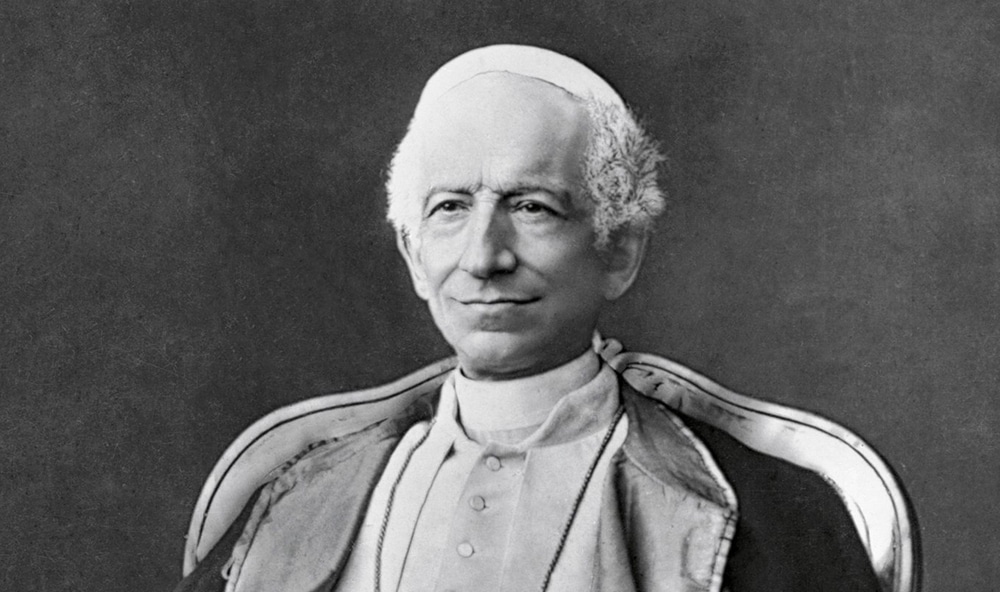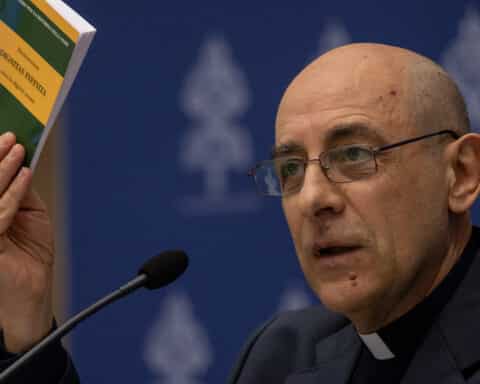Imagine working in a factory where the owner at the end of each week places an arrangement of flowers on the most productive machine, not the worker. This happened in France during the Industrial Revolution, and it’s a powerful anecdote that communicates why Pope Leo XIII thought it necessary to defend the working class in his encyclical Rerum Novarum, published May 15, 1891.
Context
For most of the 19th century, the world continued to experience great changes in society, following the various revolutions that toppled ancient regimes and even divested the papacy of its estates beyond the Vatican. Pope Leo XIII provides the context for Rerum Novarum in its opening paragraph:
“The elements of the conflict now raging are unmistakable, in the vast expansion of industrial pursuits and the marvelous discoveries of science; in the changed relations between master and workman; in the enormous fortunes of some few individuals, and the utter poverty of the masses. …”
Read more from our Church Documents series here.

Pope Leo XIII perceived a threat against the working class. The industrial revolution changed how people worked and provided for their families. The “marvelous discoveries of science” resulted in machines that produced goods more efficiently than workers, and the machines made their owners wealthy. The working class, used to plying crafts and trades for their living, found themselves exchanging labor for wages. Whereas craftsmen had guilds to protect their interests, laborers had no advocate. The pope laments that “working men have been surrendered, isolated and helpless, to the hardheartedness of employers and the greed of unchecked competition … so that a small number of very rich men have been able to lay upon the teeming masses of the laboring poor a yoke little better than that of slavery itself” (No. 3).
Seeing the situation clearly, Pope Leo XIII brings the light of Scripture and Tradition to bear upon the working class’ plight and, based on his reflections, offers a remedy in Rerum Novarum. In addition to naming the remedy, the pope states where it must be found and how it should be applied, with due consideration of “the relative rights and mutual duties of the rich and of the poor, of capital and of labor” (No. 2). In essence, Rerum Novarum calls everyone to honor the God-given dignity of each human person, rich and poor alike, by eradicating greed and encouraging private property for all. However, those who are poor deserve special attention in their efforts at making a living since they are more easily oppressed.
Content
The pope states that the remedy “to alleviate the condition of the masses … must be the inviolability of private property” (No. 15), a principle rooted in Scripture, which condemns coveting someone else’s property (cf. No. 11). Moreover, God’s natural law obliges man to preserve his life and his family’s lives, without ignoring the common good (cf. Nos. 9, 12). Private property enables man to keep these obligations. Indeed, using the gift of reason, he cultivates his portion of the land (or directs his wages) for immediate needs and future use. Therefore, man has the inherent right — prior to any consideration of the state — to acquire adequate resources for life, which the attainment of private property allows (cf. No. 7).
The pope then notes that the right to private property must be found through a cooperation among the members of society. The Church, the rulers of states, employers of labor, the wealthy and even laborers themselves must participate in the effort to further the interests of the working classes.
The goal is not a utopia or a society where everything is held in common, as some of the pope’s detractors argued at the time. On the contrary, there are real differences among men (not to mention the realities of sin and evil). Some men make more money than others. People have various talents. Nevertheless, these differences need not lead to hostility between the classes. Neither does it mean that one person should live in opulence and another in poverty. As Pope Leo XIII points out, “capital cannot do without labor, nor labor without capital” (No. 19). They can and should work together for the common good as determined by justice. One might even say that God allows the differences precisely so that people learn how to live in community.
The common good comes about when each person and group attend not only to their rights but also their duties — In other words, when they live a virtuous life. The Church contributes to this effort by forming men in the practice of virtue (cf. No. 28), which is “equally within reach of high and low, rich and poor” (No. 24). From the perspective of eternity, one’s social standing offers no advantage. God loves each person equally. But how one lives and uses one’s gifts will be liable to God’s judgment. The encyclical provides a list of duties for both workers and employers that respects the dignity of others and upholds the obligations of justice (cf. No. 20). Ultimately, each person is called to “brotherly love” (No. 25), to follow the way of Jesus.
Rerum Novarum offers a number of practical applications that respect the right of private property and support the common good. The working class provides the commodities that help the state increase its wealth (cf. No. 34). Virtuous employers seek not only financial gain but also the good of their employees and society. The Church establishes organizations (like Catholic Charities) to care and advocate for the less fortunate. And the state has the primary duty “to realize public well-being and private prosperity,” regarding the interests of all — high and low alike — as equal (No. 32).
An exemplary way the state supports the working classes, according to Rerum Novarum, is to encourage and protect organizations and unions that draw employers and workers together. Such unions have the advantage of allowing the two classes to make mutual agreements that protect the rights of each and promote the exercise of their duties. The state should intervene when there is need for a remedy of an evil or the removal of some mischief, making sure the interference does not go beyond the remedy (cf. No. 36).
Pope Leo XIII concludes that when the members of society work together for the common good, grounded in virtue and justice, with the result that even the working man can comfortably support himself and his family by obtaining private property (land, wages), a few excellent results follow: The gulf between vast wealth and sheer poverty will be bridged over, all men will be more fruitful in their labors, and citizens would remain in their own country rather than trying to find a decent life elsewhere (cf. No. 47).
Call
Having laid out the remedy, where it must be found and how it is to be applied, the pope calls everyone to action: “Everyone should put his hand to the work which falls to his share, and that at once and straightway, lest the evil which is already so great become through delay absolutely beyond remedy” (No. 62).
Few people would argue that we are beyond remedy when it comes to the allocation of property (income, wealth) and power in our world. Efforts to alleviate poverty and rid the world of greed and tyranny have never ceased. However, few would disagree that we still have real injustices to fix and challenges to face. For example, we live in a society that countenances each of the top 15 hedge fund managers making more than $840 million a year while elementary school teachers need two incomes to afford a decent home. Most U.S. citizens simply assume that the economic system unfairly favors politicians, large corporations and wealthy people. Meanwhile, perhaps in reaction to such injustices, we have an upcoming generation that espouses Marxist ideas like the rejection of private property and Christian morality. Clearly, we have a lot of work to do in the areas of justice and love.
Rerum Novarum still speaks to us despite being published 131 years ago and offers a way to respond to the injustices of our time. Pope Leo XIII, in writing the encyclical, employed a theological method he learned from studying St. Thomas Aquinas. The method includes three steps: seeing the reality of the times, judging what one sees through the lens of divine revelation (sacred Scripture and sacred Tradition), and acting according to the conclusion reached by prayerful discernment.
Belgian Cardinal Joseph Cardijn (1882-1967), who was a student and admirer of Pope Leo XIII, developed the pope’s method for labor groups, especially young workers, to engage society on the important issues of their time. Even Pope St. John Paul II, 100 years after Rerum Novarum, recommended the method of See-Judge-Act “as a lasting paradigm for the Church,” a tool to be used in order to weigh in on “specific human situations, both individual and communal, national and international” (Centesimus Annus, No. 5). In this way, the Church exercises its duty as a “citizen” to help bring about the common good and keep the world focused on God’s plan of salvation. It’s a duty each of us shares.
David Werning writes from Virginia.
| Further reading |
|---|
|
Two encyclicals that build upon the teaching of Rerum Novarum are Quadragesimo Anno, issued by Pope Pius XI on May 15, 1931, and Centesimus Anno, issued by Pope St. John Paul II on May 15, 1991. Quadragesimo Anno, like Rerum Novarum, looks at issues of fair wages and private property but considers as well the condition of society at large when challenged by systems that espouse individualism or communism. Pope Pius XI introduces the idea of subsidiarity, the notion that the person or group closest to a problem should resolve it. The state should promote the efforts of local groups, as well as get involved when needed. Centesimus Annus begins with John Paul’s reading of Rerum Novarum, lauding it for championing the rights of workers. He goes on to write about how the market should always prioritize the dignity of the human person. Pope Francis’ encyclicals Laudato Si’ and Fratelli Tutti can also be read in light of Rerum Novarum. Both of Pope Francis’ encyclicals build on the theme of human dignity and especially the dignity of the worker, who should not be exploited or treated as a commodity. |





